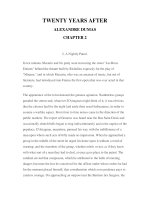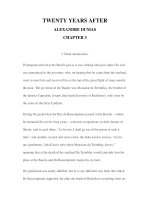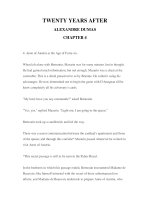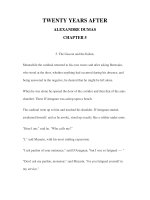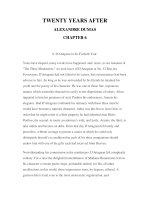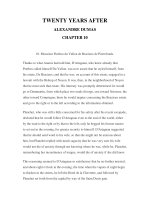LUYỆN ĐỌC TIẾNG ANH QUA CÁC TÁC PHẨM VĂN HỌC –TWENTY YEARS AFTER ALEXANDRE DUMAS CHAPTER 68 docx
Bạn đang xem bản rút gọn của tài liệu. Xem và tải ngay bản đầy đủ của tài liệu tại đây (22.02 KB, 9 trang )
TWENTY YEARS AFTER
ALEXANDRE DUMAS
CHAPTER 68
68. Cromwell's House.
It was, in fact, Mordaunt whom D'Artagnan had followed, without knowing it.
On entering the house he had taken off his mask and imitation beard, then,
mounting a staircase, had opened a door, and in a room lighted by a single lamp
found himself face to face with a man seated behind a desk.
This man was Cromwell.
Cromwell had two or three of these retreats in London, unknown except to the
most intimate of his friends. Mordaunt was among these.
"It is you, Mordaunt," he said. "You are late."
"General, I wished to see the ceremony to the end, which delayed me."
"Ah! I scarcely thought you were so curious as that."
"I am always curious to see the downfall of your honor's enemies, and he was
not among the least of them. But you, general, were you not at Whitehall?"
"No," said Cromwell.
There was a moment's silence.
"Have you had any account of it?"
"None. I have been here since the morning. I only know that there was a
conspiracy to rescue the king."
"Ah, you knew that?" said Mordaunt.
"It matters little. Four men, disguised as workmen, were to get the king out of
prison and take him to Greenwich, where a vessel was waiting."
"And knowing all that, your honor remained here, far from the city, tranquil and
inactive."
"Tranquil, yes," replied Cromwell. "But who told you I was inactive?"
"But if the plot had succeeded?"
"I wished it to do so."
"I thought your excellence considered the death of Charles I. as a misfortune
necessary to the welfare of England."
"Yes, his death; but it would have been more seemly not upon the scaffold."
"Why so?" asked Mordaunt.
Cromwell smiled. "Because it could have been said that I had had him
condemned for the sake of justice and had let him escape out of pity."
"But if he had escaped?"
"Impossible; my precautions were taken."
"And does your honor know the four men who undertook to rescue him?"
"The four Frenchmen, of whom two were sent by the queen to her husband and
two by Mazarin to me."
"And do you think Mazarin commissioned them to act as they have done?"
"It is possible. But he will not avow it."
"How so?"
"Because they failed."
"Your honor gave me two of these Frenchmen when they were only guilty of
fighting for Charles I. Now that they are guilty of a conspiracy against England
will your honor give me all four of them?"
"Take them," said Cromwell.
Mordaunt bowed with a smile of triumphant ferocity.
"Did the people shout at all?" Cromwell asked.
"Very little, except `Long live Cromwell!'"
"Where were you placed?"
Mordaunt tried for a moment to read in the general's face if this was simply a
useless question, or whether he knew everything. But his piercing eyes could by
no means penetrate the sombre depths of Cromwell's.
"I was so situated as to hear and see everything," he answered.
It was now Cromwell's turn to look fixedly at Mordaunt, and Mordaunt to make
himself impenetrable.
"It appears," said Cromwell, "that this improvised executioner did his duty
remarkably well. The blow, so they tell me at least, was struck with a master's
hand."
Mordaunt remembered that Cromwell had told him he had had no detailed
account, and he was now quite convinced that the general had been present at
the execution, hidden behind some screen or curtain.
"In fact," said Mordaunt, with a calm voice and immovable countenance, "a
single blow sufficed."
"Perhaps it was some one in that occupation," said Cromwell.
"Do you think so, sir? He did not look like an executioner."
"And who else save an executioner would have wished to fill that horrible
office?"
"But," said Mordaunt, "it might have been some personal enemy of the king,
who had made a vow of vengeance and accomplished it in this way. Perhaps it
was some man of rank who had grave reasons for hating the fallen king, and
who, learning that the king was about to flee and escape him, threw himself in
the way, with a mask on his face and an axe in his hand, not as substitute for the
executioner, but as an ambassador of Fate."
"Possibly."
"And if that were the case would your honor condemn his action?"
"It is not for me to judge. It rests between his conscience and his God."
"But if your honor knew this man?"
"I neither know nor wish to know him. Provided Charles is dead, it is the axe,
not the man, we must thank."
"And yet, without the man, the king would have been rescued."
Cromwell smiled.
"They would have carried him to Greenwich," he said, "and put him on board a
felucca with five barrels of powder in the hold. Once out to sea, you are too
good a politician not to understand the rest, Mordaunt."
"Yes, they would have all been blown up."
"Just so. The explosion would have done what the axe had failed to do. Men
would have said that the king had escaped human justice and been overtaken by
God's. You see now why I did not care to know your gentleman in the mask; for
really, in spite of his excellent intentions, I could not thank him for what he has
done."
Mordaunt bowed humbly. "Sir," he said, "you are a profound thinker and your
plan was sublime."
"Say absurd, since it has become useless. The only sublime ideas in politics are
those which bear fruit. So to-night, Mordaunt, go to Greenwich and ask for the
captain of the felucca Lightning. Show him a white handkerchief knotted at the
four corners and tell the crew to disembark and carry the powder back to the
arsenal, unless, indeed "
"Unless?" said Mordaunt, whose face was lighted by a savage joy as Cromwell
spoke:
"This skiff might be of use to you for personal projects."
"Oh, my lord, my lord!"
"That title," said Cromwell, laughing, "is all very well here, but take care a word
like that does not escape your lips in public."
"But your honor will soon be called so generally."
"I hope so, at least," said Cromwell, rising and putting on his cloak.
"You are going, sir?"
"Yes," said Cromwell. "I slept here last night and the night before, and you
know it is not my custom to sleep three times in the same bed."
"Then," said Mordaunt, "your honor gives me my liberty for to-night?"
"And even for all day to-morrow, if you want it. Since last evening," he added,
smiling, "you have done enough in my service, and if you have any personal
matters to settle it is just that I should give you time."
"Thank you, sir; it will be well employed, I hope."
Cromwell turned as he was going.
"Are you armed?" he asked.
"I have my sword."
"And no one waiting for you outside?"
"No."
"Then you had better come with me."
"Thank you, sir, but the way by the subterranean passage would take too much
time and I have none to lose."
Cromwell placed his hand on a hidden handle and opened a door so well
concealed by the tapestry that the most practiced eye could not have discovered
it. It closed after him with a spring. This door communicated with a
subterranean passage, leading under the street to a grotto in the garden of a
house about a hundred yards from that of the future Protector.
It was just before this that Grimaud had perceived the two men seated together.
D'Artagnan was the first to recover from his surprise.
"Mordaunt," he cried. "Ah! by Heaven! it is God Himself who sent us here."
"Yes," said Porthos, "let us break the door in and fall upon him."
"No," replied D'Artagnan, "no noise. Now, Grimaud, you come here, climb up
to the window again and tell us if Mordaunt is alone and whether he is preparing
to go out or go to bed. If he comes out we shall catch him. If he stays in we will
break in the window. It is easier and less noisy than the door."
Grimaud began to scale the wall again.
"Keep guard at the other door, Athos and Aramis. Porthos and I will stay here."
The friends obeyed.
"He is alone," said Grimaud.
"We did not see his companion come out."
"He may have gone by the other door."
"What is he doing?"
"Putting on his cloak and gloves."
"He's ours," muttered D'Artagnan.
Porthos mechanically drew his dagger from the scabbard.
"Put it up again, my friend," said D'Artagnan. "We must proceed in an orderly
manner."
"Hush!" said Grimaud, "he is coming out. He has put out the lamp, I can see
nothing now."
"Get down then and quickly."
Grimaud leaped down. The snow deadened the noise of his fall.
"Now go and tell Athos and Aramis to stand on each side of the door and clap
their hands if they catch him. We will do the same."
The next moment the door opened and Mordaunt appeared on the threshold,
face to face with D'Artagnan. Porthos clapped his hands and the other two came
running around. Mordaunt was livid, but he uttered no cry nor called for
assistance. D'Artagnan quietly pushed him in again, and by the light of a lamp
on the staircase made him ascend the steps backward one by one, keeping his
eyes all the time on Mordaunt's hands, who, however, knowing that it was
useless, attempted no resistance. At last they stood face to face in the very room
where ten minutes before Mordaunt had been talking to Cromwell.
Porthos came up behind, and unhooking the lamp on the staircase relit that in
the room. Athos and Aramis entered last and locked the door behind them.
"Oblige me by taking a seat," said D'Artagnan, pushing a chair toward
Mordaunt, who sat down, pale but calm. Aramis, Porthos and D'Artagnan drew
their chairs near him. Athos alone kept away and sat in the furthest corner of the
room, as if determined to be merely a spectator of the proceedings. He seemed
to be quite overcome. Porthos rubbed his hands in feverish impatience. Aramis
bit his lips till the blood came.
D'Artagnan alone was calm, at least in appearance.
"Monsieur Mordaunt," he said, "since, after running after one another so long,
chance has at last brought us together, let us have a little conversation, if you
please."

